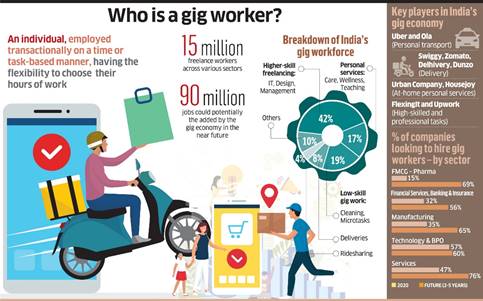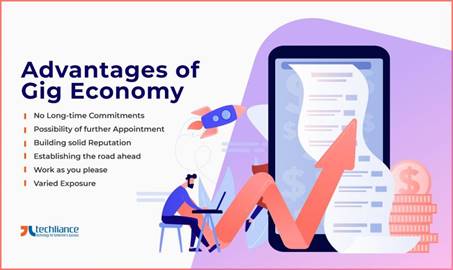The Center is going to hold talks about the situation of the GIG economy and workers in India through the V.V. Giri Institute. This institute is going to present models of different countries like Thailand, Malaysia, and China on how they deal with the security issues of gig workers. This is made up of workers who work in a business that is temporary in nature. They have flexible jobs and commonplace and they tend to hire independent contractors and freelancers instead of full-time employees. Although they do not have a proper institution they are providing huge employment. E.g. Swiggy, Zomato, Uber, Ola etc.

Potential in India
We can see that the gig economy is expanding after the pandemic, business models have changed and for that many reasons it is important for the Indian government to know about them in order to make policy on how to ensure that the gig economy workers like the other organized workers are involved in the organized portal under Ministry of Labour. Because until and unless we know what is the amount of gig economy workers in our economy we won’t be able to formulate policies for their social security such as medical insurance, NPS, EPFO, etc. 56% of new employment in India is being generated by the gig economy and mostly they are demanded in the blue-collar and white-collar workforce. There is a huge demand for salespeople, web designers, content writers, and software developers.


Why gig economy so attractive?
- Flexibility to work from anywhere
- Challenging work approach
- Business models
- The emergence of start-up culture.
- Rising demand for contractual Employees

What are the issues?
- Because this economy is so large and so huge and there is no proper portal for them to be enrolled. That is it is highly unregulated in Nature.
- Need for skills.
- Demand supply Mismatch.
Associated Legislation
- The code on Wages 2019, says for universal minimum wage and floor wage across organized and unorganized sectors, including gig workers.
- The code on Social Security 2020, accepted gig workers as a new occupational category.
- It means there is recognition for the gig workers but not the social security. In countries like Thailand and Malaysia ride companies like Ola, and Uber are deducting 2% of the rides in order to provide social security like medical insurance, Epfo, etc. to their employees.
Way Forward
- Portal Creation.
- Strengthen legislative support.
- Empower the gig Workers.
- Offer Mandatory coverage to platform Workers.
- Build the Right Physical and Social Infrastructure.
Read More Circular Economy



